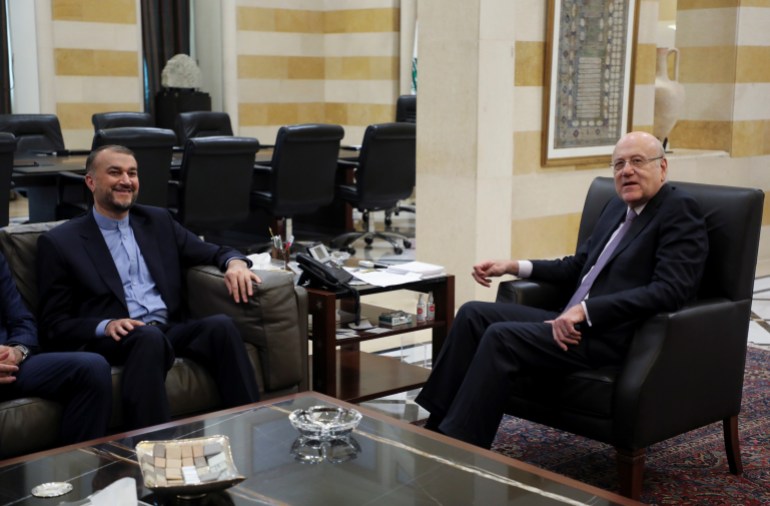Iranian foreign minister meets top Lebanese officials
Hossein Amirabdollahian says Tehran willing to rebuild Beirut port and construct two power plants in Lebanon.

Beirut, Lebanon – Iranian Foreign Minister Hossein Amirabdollahian has said Tehran would be willing to rebuild Beirut’s destroyed port and construct two electric power plants in Lebanon.
Amirabdollahian made the remarks at a news conference during an official visit on Thursday after holding a flurry of meetings with senior Lebanese officials in which he expressed Tehran’s willingness to support the cash-strapped country.
Keep reading
list of 3 itemsLebanon and IMF to restart technical talks on rescue funds
Hezbollah using fuel patronage to deflect anger, analysts say
Amirabdollahian held separate meetings with Lebanese President Michel Aoun and Speaker Nabih Berri, before talks with recently appointed Prime Minister Najib Mikati. The visit also included talks with Foreign Minister Abdallah Bou Habib, representatives from Palestinian groups and the Shia political movement Hezbollah, Iran’s key ally in Lebanon.
At a press conference after the talks with Berri, Amirabdollahian said “there was a mutual agreement about the need to strengthen bilateral ties in various ways.”
He said they spoke about the importance of Hezbollah’s armed forces to deter Israel, and a handful of regional issues.
“I would like to assure you that the Islamic Republic of Iran will always stand alongside to Lebanon and assist it in overcoming the various problems it is going through,” Amirabdollahian said.

A small protest against the Iranian foreign minister’s visit took place in Beirut on Wednesday, with dozens of protesters railing against what they perceive as growing Iranian influence in Lebanon.
The visit comes nearly one month after Mikati returned for a third stint as prime minister at the head of Lebanon’s first full-fledged government in more than a year.
Lebanon remains mired in an economic collapse that has plunged three-quarters of the population into poverty in recent months as a crippling fuel crisis has halted much of public life, with homes and hospitals struggling to keep the lights on. One in four people now relies on food assistance from the United Nations World Food Programme.
Amirabdollahian had earlier said Tehran is committed to supporting Lebanon to break the “unjust siege”.
Last month, Hezbollah facilitated the import of Iranian fuel into the country via the Syrian port of Baniyas and through unofficial border crossings. The movement’s supporters have perceived the deliveries as a victory against US sanctions on Syria, Iran, and Hezbollah, which the United States designates as a “terrorist” organisation.
Mikati has previously described the deliveries as a violation of Lebanese sovereignty.
“Lebanon welcomes any effort from brotherly and friendly countries and the international community,” Mikati said after meeting Amirabdollahian on Thursday. “As long as it falls within the context of helping it preserve the state, its institutions, its role in protection and care, and the strengthening of its legitimate security and military forces.”
Hezbollah’s Secretary-General Hassan Nasrallah has repeatedly expressed an interest in improving trade with Tehran and Beijing, who he said were willing to support Lebanon with fewer restrictions than Western countries.
Hezbollah has widened its patronage and social services networks since the financial crisis hit the country, as state institutions continue to crumble.
Prime Minister Mikati says he intends to improve ties between Lebanon and the international community, especially in the region. Ties with Saudi Arabia, an adversary of Hezbollah and Iran, are currently at an all-time low, after Riyadh implemented a ban on importing Lebanese produce last April.
The international community has urged Lebanon to reform its battered economy by ending rampant corruption and wasteful spending, restructuring its debt and dysfunctional electricity sector, and increasing transparency mechanisms, in order to unlock economic aid.
Lebanon has resumed technical talks with the International Monetary Fund, hoping to resume negotiations for a bailout programme.